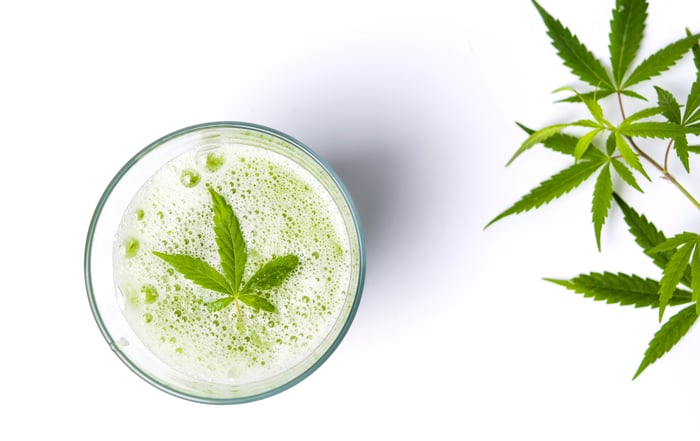If you're a growth-seeking investor, there's no industry that's probably catching your attention more right now than legal marijuana. The duo of Arcview Market Research and BDS Analytics have called for global sales growth of 38% in 2019 to $16.9 billion, while Wall Street biggest cheerleader, Cowen Group, has forecast $75 billion in worldwide annual sales by 2030. With growth this robust, there are bound to be quite a few winners in the space.
One company that investors seem to be behind in the success category is Aurora Cannabis (ACB -4.85%). Through a combination organic growth projects, joint venture cultivation partnerships, and multiple acquisitions, Aurora looks to be on track to lead all growers with 700,000 kilograms of peak annual output. Being a production leader should help reduce per-gram growing costs as economies of scale take shape, and it'll make Aurora Cannabis a logical choice for long-term supply deals domestically and abroad.

Image source: Getty Images.
This is also a company that's done a bang-up job of pushing into international markets. Following the announcement of a 51% equity stake in Gaia Pharm in Portugal, Aurora now has a presence in 24 countries, including Canada. These foreign markets will prove particularly handy if and when domestic Canadian dried flower supply becomes commoditized. In order to avoid margin deterioration, these external sales channels will prove critical in helping Aurora Cannabis to offload its supply.
The one thing Aurora lacks: A brand-name partner
But the one thing Aurora doesn't have is a brand-name partner. Canopy Growth landed a major investment from Constellation Brands, Cronos Group recently closed on an equity investment from Altria, and Tilray has partnered with both Novartis (through a subsidiary) and Anheuser-Busch InBev. Yet no partner for the largest projected producer in the world, as of yet.
However, with the hiring of activist investor Nelson Peltz as a strategic advisor to the company, the expectation is for a partnership opportunity to emerge sometime soon. While these are nothing more than guesses on my part, here are four partnership opportunities for Aurora Cannabis that would, at least on the surface, seem logical.
Check out the latest earnings call transcripts for the companies we cover.

Image source: Coca-Cola.
Coca-Cola
One of the more likely partnership opportunities lies with beverage giant Coca-Cola (KO -0.24%). For those who may not recall, Coca-Cola was reported to be in discussions with Aurora Cannabis this past September about a possible partnership, joint venture, or even an equity stake. With soda sales falling flat in the U.S., Coca-Cola has been exploring new opportunities to drive top-line growth. Presumably, with nonalcoholic cannabis-infused beverages expected to become legal in Canada by this coming October, this would give Aurora and Coca-Cola a means to team up and bring their respective strengths to the table.
Coca-Cola ultimately wound up walking away just a few weeks later without a deal, suggesting instead that it would monitor progress for the cannabis industry from the sidelines. My suspicion is that Aurora's equity asking price may have been too high at the time. However, with Peltz leading the charge for strategic opportunities and having a keen understanding of the food and beverage space, I'd have to think that Coca-Cola is back in the picture.

Image source: Getty Images.
Mondelez International
Beyond sparkling beverages we have snack food giant Mondelez International (MDLZ -1.23%). Mondelez is the company behind such brands as Oreo, Ritz, Chips Ahoy, Triscuit, and Nabisco. With Health Canada outlining its intention of legalizing alternative consumption options come October, it means that edibles will soon find their way to dispensary store shelves. Since edible consumption (at least in the U.S.) has gravitated toward sweets, such as cookies and chocolates, Mondelez's snack lineup would make the perfect pairing for Aurora's tetrahydrocannabinol (THC) and/or cannabinol (CBD) products. THC is the psychoactive cannabinoid responsible for getting a user high, whereas CBD is the nonpsychoactive cannabinoid best known for its perceived medical benefits.
A big reason Mondelez is a logical partner is that Trian Fund Management, which Peltz founded, owns over 18.8 million shares of Mondelez, and Trian Fund President Peter May is on the company's board of directors. Back in 2014, Peltz unsuccessfully lobbied for PepsiCo to break into separate food and beverage divisions, and have that food division (Frito-Lay) purchase Mondelez. But if Peltz can orchestrate a partnership between Aurora and Mondelez he'll have a nice secondary win, albeit a few years later than expected.

Image source: Getty Images.
Heineken
Although it's certainly more of a longshot than either Coca-Cola or Mondelez, global beer giant Heineken (HEINY -0.96%) would make a lot of sense as a partner for Aurora Cannabis.
Last year, Heineken subsidiary Lagunitas Brewing launched a nonalcoholic cannabis-infused beverage designed to taste like beer, called Hi-Fi Hops, in select California dispensaries. Instead of using CBD, which is the most commonly used cannabinoid in the infused beverage market, Heineken's subsidiary chose to produce the beverage in a THC-only and hybrid THC-CBD variety. The point is that Heineken has clear interest in the infused beverage space, and the company would like to expand its footprint in Europe and North America. Partnering with Aurora on a more global scale would get that done.
Heineken has a relatively small presence in Canada, where Aurora could lend a hand to increase its brand exposure. Meanwhile, Aurora's recent push into numerous medically legal European countries, and Heineken's considerably stronger market share in Europe, would create an opportunity for Heineken to return the favor. Although not all EU countries allow medical patients to consume infused beverages, this partnership would be a play on legalizations to come in Europe, and potentially even the United States.

Image source: Getty Images.
Roche
Finally, the longest shot of all, but nevertheless a logical potential partner, would be global pharmaceutical company Roche (RHHBY -0.03%). Since Aurora Cannabis will be focusing its attention on higher margin medical marijuana patients, rather than lower-margin recreational weed consumers, it would help to have a global distribution partner in place (like Roche) that can push non-combustible pot products in foreign markets. If this sounds familiar, it's because Tilray has the same deal going with Sandoz, Novartis' generic-drug subsidiary.
But why Roche and not some other large pharmaceutical company? While arguably a bit of a stretch to connect the dots, no company offers a broader portfolio of cancer drugs than Roche. From a medical perspective, cannabis is often used as a treatment for cancer pain and/or as a palliative means to improve appetite during cancer treatment. In other words, partnering with Aurora would give Roche a new means with which to improve the overall well-being of cancer patients during treatment, while buffering its bottom line with a global distribution agreement.
The big question is, what's next for Aurora Cannabis?





